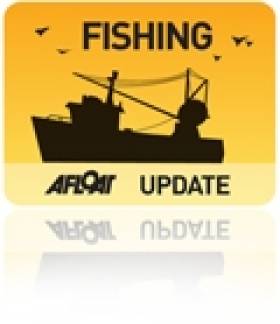Displaying items by tag: Marine Stewardship Council (MSC) Certification
Fishermen Rewarded with Prestigious Marine Stewardship Certificates
Peter Whelan, Chairman of the Sea-Fisheries Protection Authority (SFPA), presented Gavin Power, Chairman of the Celtic Sea Herring Management Advisory Committee (CSHMAC) with the MSC Certification for Polyvalent Mackerel, today at the SFPA's Headquarters in Clonakilty, Co Cork.
Gavin Power of the Irish South and West Fish Producers' Organisation (IS&WFPO) and Chairman of the CSHMAC, said: "We are delighted to receive MSC Certification which is part of a structured approach towards improving the management and added value return from the polyvalent mackerel fishery. Importantly, this certification initiative represents the first such award for the Irish polyvalent sector and would not have been possible without the full support of the SFPA, the Marine Institute, the Department of Agriculture, Fisheries & Food and Bord Iascaigh Mhara.
MSC certification recognises sustainable practices in this important fishery, rewards robust governance, environmentally responsible and sustainable fishing practices and empowers consumers through the use of the label to make the best environmental choice."
Peter Whelan, Chairman of the SFPA said: "The CSHMAC's securing of the MSC's fishery certification program and seafood eco-label is significant as it recognises and rewards sustainable fishing and promotes the best environmental choice in seafood overall. Good governance and management frameworks safeguards jobs, secures fish stocks for the future and help to protect the marine environment. The MSC standard means sustainable fisheries can be recognised and rewarded in the marketplace and gives an assurance to buyers and consumers that their seafood comes from a well-managed and sustainable source."






























































